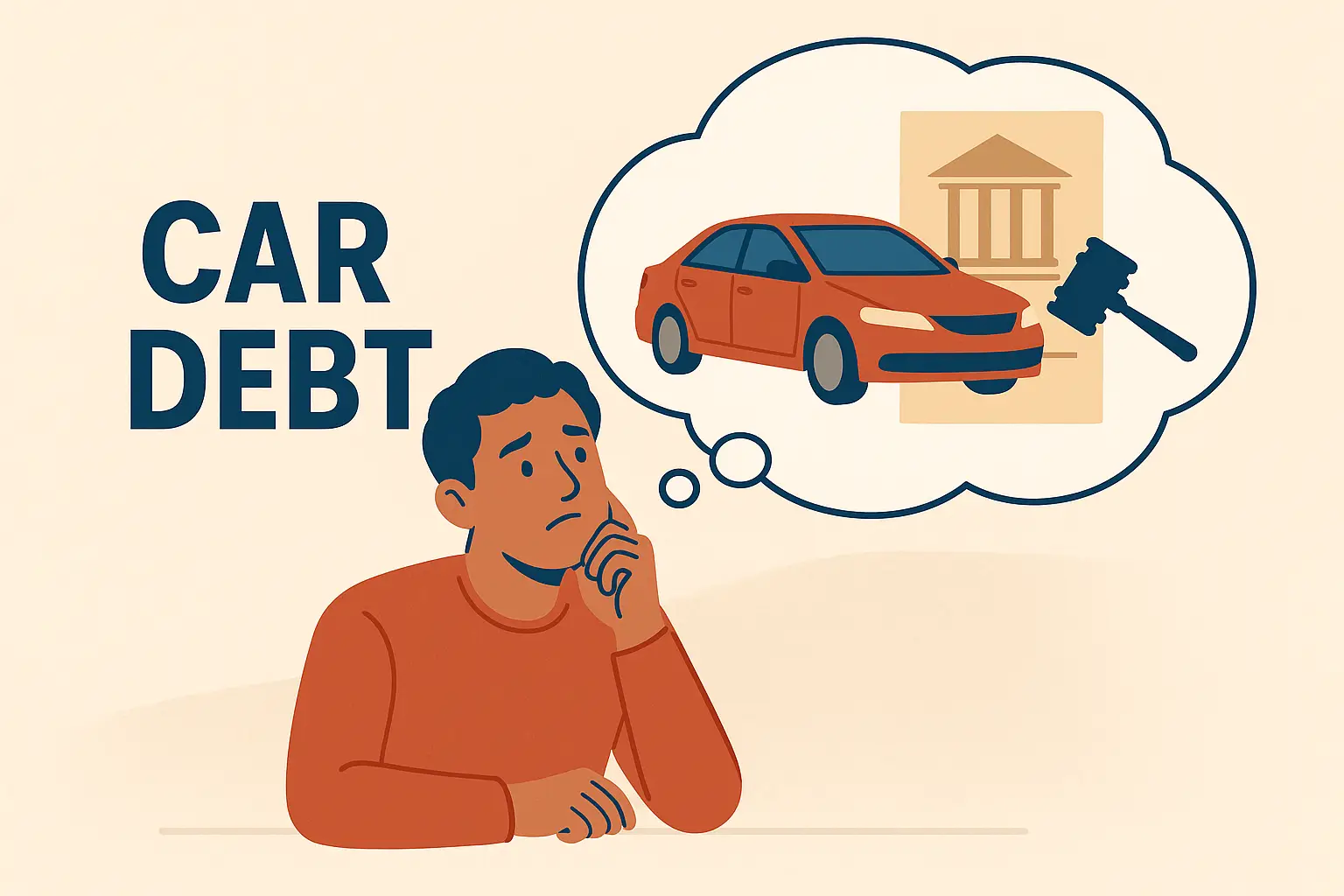Guide to Auto Loan Debt in the United States
What Is Auto Loan Debt?
Auto loan debt is a secured debt used to finance a vehicle purchase. The car is collateral, meaning the lender can repossess it if you fail to make timely payments.
Auto loans typically involve fixed monthly payments over a term of 36 to 72 months, though longer terms are increasingly common. Falling behind on payments can result in repossession, collections, and damage to your credit score.

Why Does Auto Loan Debt Lead to Repossession or Collections?
- Secured by the Vehicle: Missed payments can quickly lead to repossession without court action in many states.
- High Depreciation: Cars lose value rapidly, so lenders act quickly to recover losses.
- Strict Loan Terms: Many lenders offer little flexibility once the loan has defaulted.
- Subprime Loans: Borrowers with poor credit may face higher interest rates and a greater risk of default.
The Auto Loan Default and Repossession Process
- Missed Payments: Typically, after 30 days, the loan is considered delinquent.
- Default: After 60–90 days, the lender may begin repossession.
- Repossession: The lender may reclaim the vehicle without warning or court approval (depending on state law).
- Auction Sale: Repossessed vehicles are often sold at auction.
- Deficiency Balance: You may owe the difference if the sale doesn’t cover the loan balance.
Options to Avoid or Resolve Auto Loan Debt Issues
- Refinancing: Replace your current loan with one that has better terms.
- Loan Modification: Request a temporary payment reduction or extension.
- Voluntary Surrender: Returning the car before repossession may reduce fees but still impacts your credit.
- Negotiate a Settlement: After repossession or charge-off, negotiate a reduced payoff.
- Bankruptcy: Chapter 13 may help catch up on payments; Chapter 7 may discharge the debt.
Consumer Rights and Protections (Auto Loan Debt)
Repossession Laws
- No Breach of Peace: Lenders may not use force or threats during repossession.
- Notice Requirements: Some states require a notice before or after repossession.
- Right to Redeem: You can reclaim your car in many states by paying the full past-due balance before it’s sold.
Debt Collection Protections (FDCPA)
Once your loan is in default and sold to a third-party collector, the Fair Debt Collection Practices Act (FDCPA) applies. You have the right to:
- Dispute the debt within 30 days
- Request written validation
- Be protected from harassment or false threats
State Law Variations
- Repossession Rules: Vary by state—some require court approval, others don’t.
- Redemption Periods: Some states allow you to reclaim the vehicle after repossession.
- Deficiency Judgments: You may be sued for the unpaid balance after the auction.
States Where Debt Collectors Do NOT Require a License (as of 2024)
Georgia, Kansas, Kentucky, Michigan, Missouri, Montana, New Hampshire, Oklahoma, Pennsylvania, South Carolina, South Dakota, Tennessee, Wyoming
Always check with your state Attorney General for updated licensing laws.
Why Licensing and Legal Compliance Matter
- Unlicensed collectors may be acting illegally in states with licensing requirements.
- You can use licensing status to challenge or dispute collection activity.
- Properly licensed agencies are subject to consumer protection regulations.
How to Verify a Collector or Repossession Company
- Request written validation of the debt
- Confirm the collector is licensed in your state
- Contact your original lender to verify the collector’s authority
- Watch for warning signs like threats, vague details, or pressure tactics
Options for Borrowers Facing Repossession
- Communicate Quickly: Contact your lender at the first sign of trouble
- Ask for Hardship Programs: Some lenders offer temporary relief
- Avoid Abandoning the Car: This can lead to faster repossession and more costs
- Explore Voluntary Return: May reduce fees but still impacts credit
- Legal Help: Some nonprofit legal aid organizations help with wrongful repossessions
Key Takeaways
- Auto loan debt is secured by your vehicle, making it subject to quick repossession
- Consumers have federal protections under FDCPA and state-specific repossession rules
- Communication with your lender is essential to avoid or delay repossession
- You may still owe money after repossession if the car sells for less than the loan balance
Sources
- https://www.consumerfinance.gov/ask-cfpb/what-happens-if-i-dont-pay-my-car-loan-en-713/
- https://www.consumer.ftc.gov/articles/auto-loans-and-repossessions
- https://www.nolo.com/legal-encyclopedia/car-repossession-basics.html
- https://www.consumerfinance.gov/consumer-tools/auto-loans/
- https://www.nclc.org/issues/debt-collection.html
